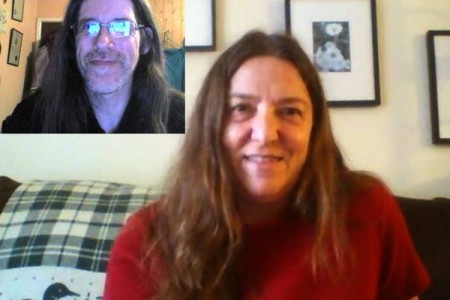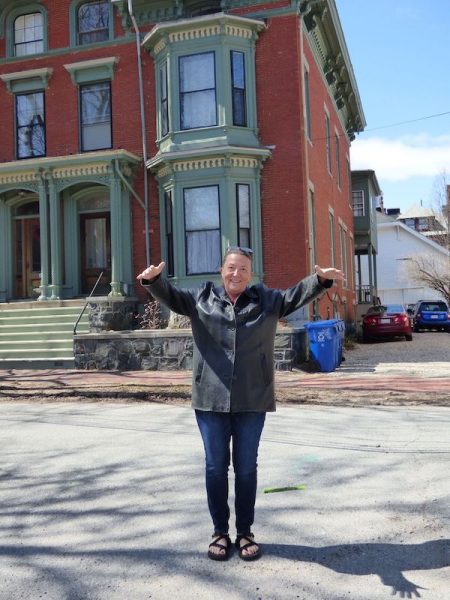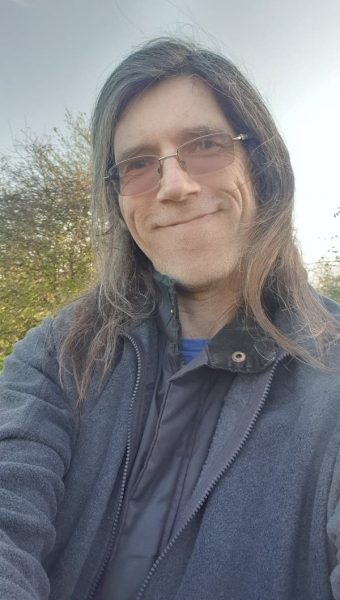I first met Fran Houston and Marty Baker in 2015. Fran and I sat in her living room in Portland, Maine and chatted online with Marty, who lives in England. They are each other’s best friend and yet, they’ve only met in person once. They’ve even written books together. You can read all about their friendship in this blog post and listen to our conversation about their first book High Tide, Low Tide in this podcast.
During this global pandemic, I find myself wondering all the time how others are coping. I’m constantly asking people and they ask me, too. How are you doing? Are you ok? The very thing that is keeping so many of us isolated is also motivating us to reach out more.
Recently, I was wondering about Fran and Marty so I sent them a message and asked if they’d like to write something about how they are doing. Here’s what they have to say:
Stay Home, Stay Safe, Stay Connected: Our 3,000 Mile Friendship and the Coronavirus Pandemic
By Martin Baker and Fran Houston
Fran and I have been best friends since we met online in May 2011. Fran lives in Portland, Maine. I’m three thousand miles away in the north-east of England. Fran lives with bipolar disorder, chronic fatigue syndrome (CFS/ME), and fibromyalgia. Despite being on the other side of the Atlantic I’m her primary caregiver and life-line. We’ve learned a lot about how to support friends and loved ones at a distance and those lessons are serving us well now. Coronavirus has affected us in different ways, but we stay connected and are moving through this crisis together.
Fran’s Story
The most important things in my life are my home, my friends, and traveling. I love to travel and I don’t want to stop just because I have an illness. I have always wanted to travel away from Maine in March and planned two trips this year, to visit friends in Arizona and Florida. I wasn’t sure I would be able to but I took proper advice including my doctor. I am glad I got to go before everything closed down. There wasn’t a lot going on about coronavirus when I was in Arizona but in Florida, I was paying close attention. I was really taken with what Maine Governor Janet Mills was putting in place. People invited me to stay in Florida but I needed to get home and felt I would be safest here. There are rules about not staying where you are not resident and I didn’t want to be there with all the Spring Break people. I came home four days earlier than I planned.
I have no coronavirus symptoms, just the sneezes and cough and runny nose I always seem to have, but I decided to self-isolate for fourteen days. It felt safer for me and for others I might come into contact with. I check my temperature every day and watch for any change in my symptoms. I feel well supported. A friend gave me a ride when I needed one which was lovely. Another friend who is seventy-seven wants to cook me a meal and leave it at the curb for me. Another friend filled up my pantry and refrigerator. In many ways, self-isolation is how I usually live, except going out with friends and having friends over has been curtailed and I can’t go to my fitness class at the YMCA. But I’m doing the class on Zoom from my apartment. It’s great to see everyone and take part. Marty and I meet every day on Skype to hang out and process what is going on in the world and relax watching movies together. I talk with other friends on the phone.
I limit what I watch about it all. I can’t watch the presidential broadcasts. Because I love New York I listen to Governor Cuomo. I also listen to Dr. Shah, the director of the Maine Center for Disease Control and Prevention every day because I want to know what is going on here and pay attention to what I need to do. I don’t want to be freaked out about it. I regularly have suicidal thoughts and on one level something like this would be welcome to me. I’d want to run down the street and lick the guard rails, like “I can catch it and check out now!” But I don’t feel anything like that. Instead, I do a lot of protecting myself and my friends because they really matter to me. I find it really interesting that my suicidal ideation has receded like this. However, Marty and I know we need to stay vigilant.
I was talking with a friend the other day about what it is going to be like when this is over. After 911 everything felt different. How will it feel after this? How can we integrate this experience into our lives in a good way? How can we prepare ourselves for re-entry?
Marty’s Story
My family and I have no coronavirus symptoms and are adapting reasonably well to the situation we find ourselves in. I work in IT and am fortunate I can work from home. It’s far from ideal – there have been tech issues and I’m cramped for space – but those are merely inconveniences. I’m classed as a key worker because of the need to keep vital services going but many key workers are far closer to the front line than me, including a close friend of mine who is a support worker. When all this is over I hope those we are caring for the sick and vulnerable, stocking the supermarket shelves, and filling the many other vital roles receive better treatment than they’ve traditionally been afforded. In addition to my technical role, I co-lead the mental health and wellbeing programme at work. As a company, we’re focused on supporting our people as we navigate these difficult times. We’re using the Five Ways to Wellness which are based on research by the New Economics Foundation.
The Five Ways are:
1. Connect with people
2. Be active
3. Keep learning
4. Give to others
5. Take noticeI’m working these into my own life, too. We are creatures of habit and it’s hard when so many of our routines have been disrupted. It helps to look for new patterns and build them into our lives where we can. One thing that helps me is my wellness tracker spreadsheet which I started ahead of Fran’s trip to Arizona. I keep my Wellness Recovery Action Plan (WRAP) handy too, in case I find myself struggling. If you have such a plan it’s worth reviewing it in case your techniques and strategies are unavailable in the current lockdown. Walking is one of my key wellbeing strategies and I’m glad I’m still able to take a daily walk for exercise.
Connection is also really important to me. I can’t meet friends in person but I’m keeping in touch with as many as possible. My friendship with Fran hasn’t really been affected by the pandemic. We’ve been through a lot in the past nine years and we know how important it is to stay connected and keep the channels of communication open. We meet each day for our video calls as usual. Maintaining this routine confirms our commitment as friends and provides much-needed structure in these uncertain times. We support each other as always. We talk about whatever is going on for us. We laugh. We watch movies. We share our thoughts and fears about the crisis and our hopes for the future.
Thank you, Fran and Marty. You are an inspiration to all of us. Not only because of how you are handling the current situation, but also because you show us what true friendship and support really mean. Stay well.




Leave A Comment